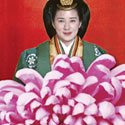
Princess Masako, Prisoner of the Chrysanthemum Throne
by Ben Hills
Penguin Group

In Princess Masako, Prisoner of the Chrysanthemum Throne: The Tragic True Story of Japan’s Crown Princess, Aussie journalist Ben Hills claims to not present any opinion, much less his own, on the subject matter presented. But from the title alone, it is clear that Hills considers Princess Masako a “prisoner” of the Japanese royal family. Descriptions like “oppressive protocol” and “arcane religious rituals” lend themselves to the fact that Hills does believe that the imperial family and its traditions subjugate women and are outdated. Not surprisingly, the publication of the Japanese translation was recently canceled by Japanese publisher Kodansha Limited. Citing “maybe more than 100 errors” in the book, the Japanese Foreign Ministry asked for corrections to be made as well as an apology from the author. Again. not surprisingly, Hills called the cancellation “censorship, pure and simple.”
Educated at Harvard and Oxford, the daughter of a prominent Japanese Foreign Ministry official, Masako Owada gave up a fast-track career as a diplomat, poised to follow in her father’s footsteps, to become Japan’s next empress. Hills explains this may sound like some sort of fairytale to the average Westerner, but this is actually far from it. Under the watchful eye of the Kunaicho, the Men in Black, who are the official agency in charge of controlling the lives of Japan’s royals, Masako will never own credit cards or a personal car and will have no voting rights and no unscripted public meetings ever again. The Imperial Household Agency’s vast army of chamberlains, chefs, sages, doctors and media manipulators rules Masako’s life as the future empress with an iron fist.
Hills dubs the situation between Prince Naruhito and Princess Masako “a love affair that went wrong,” though not much information is given regarding said love affair, other than a few lines on a few chance meetings a few years apart between the prince and his eventual wife; the vagueness could quite possibly be due to the Kunaicho’s notorious secrecy. Some time is given, though, to Masako’s reluctance to be a “bride candidate” for the 33-year-old Naruhito and join the royal family in their race to produce an heir to the throne.
Their Shinto marriage ceremony, referred to by the author as “mystical mumbo jumbo,” ended in a wedding night spent by the Prince and his new Princess in their bedroom eating ceremonial ricecakes in the hopes of welcoming a pregnancy that would bear a male heir. Unfortunately, nine years later and under constant tabloid speculation, Masako gave birth to a healthy baby girl via in-vitro fertilization, a super taboo subject for the traditional Japanese.
Masako’s descent into depression and its cause, the oppression offered by the extremely secretive Kunaicho, is the crux of Hills’ story. Through interviews with various friends, teachers and fans of Masako, Hills offers intimate details of the future Japanese emperor and empress’ upbringing, setting the stage for the royal wedding and aftermath that would rival the paparazzi-fueled lives of Princess Di and Prince Charles. Two sections of photos – black and white pictures representing life before the wedding, color glossies for during and afterwards – give the reader faces to put with names, and this helps, because with names like Naruhito and Masako, the average American is going to need any reference point he can get.
The story is tragic. Masako Owada gave up her “normal” life to become a reluctant member of one of the worlds’ longest-standing monarchies, and in the process consented to give up all of her rights as a human being and a woman. More tragic is the fact that Japanese culture accepts this as an honor and a cultural right. Nonetheless, this tragedy will most likely not hold the average American’s attention long enough to turn away from Britney and her baby’s daddy. For the Aussie and the Brit, Hills’ story of an oppressed royal told with terms like Winston Churchill’s “Black Dog” and the still common use of the word “bitch” in describing said dog should be business as usual.
Penguin Group: http://us.penguingroup.com/












